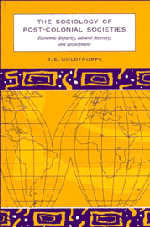Book contents
- Frontmatter
- Contents
- Preface and acknowledgements
- 1 Introduction and argument
- 2 Technology, society, and population
- 3 The colonial episode and the race question
- 4 Economic conditions
- 5 Environmental concerns
- 6 The social sciences and the ‘Third World’
- 7 The rise of towns
- 8 Family life in a changing world: two studies
- 9 Cultural diversity, language, education, and communications
- 10 Religion and development
- 11 Individual modernization: some psychological studies
- 12 Politics in post-colonial states
- 13 Aid and development
- Notes
- Index
Preface and acknowledgements
Published online by Cambridge University Press: 03 May 2011
- Frontmatter
- Contents
- Preface and acknowledgements
- 1 Introduction and argument
- 2 Technology, society, and population
- 3 The colonial episode and the race question
- 4 Economic conditions
- 5 Environmental concerns
- 6 The social sciences and the ‘Third World’
- 7 The rise of towns
- 8 Family life in a changing world: two studies
- 9 Cultural diversity, language, education, and communications
- 10 Religion and development
- 11 Individual modernization: some psychological studies
- 12 Politics in post-colonial states
- 13 Aid and development
- Notes
- Index
Summary
It was during my war service as a naval radar officer in 1942–5 in such places as Mombasa, Durban, Colombo, and Trincomalee, and through seeing at first hand the economic disparities and cultural diversities of peoples with widely different preoccupations and ways of life, that I finally decided to try to carry over the scientific attitude with which I had been imbued as a student of the natural sciences, especially at Cambridge, into the study of human society. After the war, then, I did not go back to Cambridge but went instead to the London School of Economics and Political Science to graduate afresh in economics and sociology, including social anthropology. As it had been what I saw in East Africa that had first and most strongly awakened my interest, in 1951 I eagerly accepted a post at Makerere College in Uganda (later Makerere University). There I pioneered the teaching of sociology as a degree subject, and in the process learned much and wrote something about East African society in general and the educated African elite in particular.
So it was with a somewhat narrowly East African focus that I came to Leeds in 1962, yet with a growing awareness that despite their profound diversities traditional societies throughout the world were subject to common forces making for change. Leeds proved to be a good place to seek a wider vision, with a consistently lively interest in development studies at all levels and in many departments throughout the University.
- Type
- Chapter
- Information
- The Sociology of Post-Colonial SocietiesEconomic Disparity, Cultural Diversity and Development, pp. ix - xiiPublisher: Cambridge University PressPrint publication year: 1996



